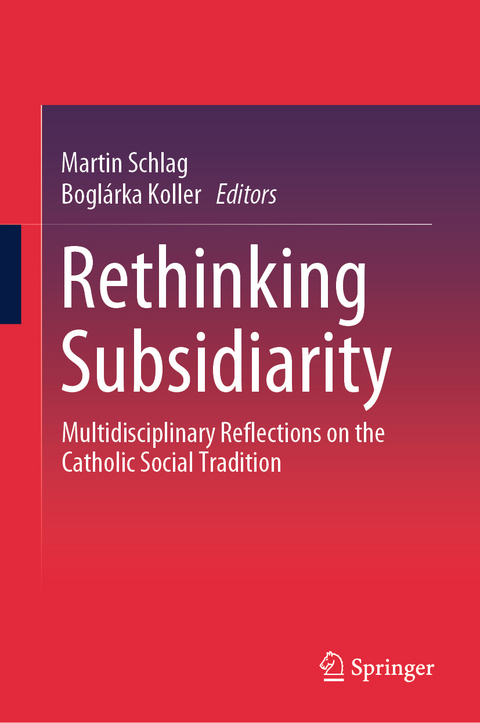
Rethinking Subsidiarity
Springer International Publishing (Verlag)
978-3-031-50142-5 (ISBN)
This book takes a fresh and interdisciplinary approach to the concept of subsidiarity. While subsidiarity is commonly understood as an organizational principle that assigns competences to the appropriate level within an organization, its application extends beyond politics. This innovative book offers a comprehensive analysis that includes religious and secular perspectives, exploring the relevance of subsidiarity to society, business, law and politics.
By bridging the gap between theology, philosophy, political science, law, and history, this volume fills a significant gap in the literature. It reexamines the ideological foundations of subsidiarity within the Catholic social tradition, investigates its practical implications, and questions how it can address the challenges faced by contemporary business environments, particularly issues of social inequity. With a normative and conceptual approach, the book critically reflects on the links between subsidiarity and themes such as responsible business practices, ecological concerns, individual autonomy, and the common good. By exploring the potential of subsidiarity to overcome dichotomies and promote a middle ground between government-based solutions and individual freedom, the volume offers valuable insights and practical solutions.
This volume stands out as the first major study dedicated to subsidiarity in society, business, law and politics. Through its multidisciplinary lens, it sheds light on unexplored connections and highlights the role of subsidiarity in fostering ethical and socially responsible behavior. It is an essential resource for researchers, PhD and graduate students, as well as professionals in theology, philosophy, political sciences, law, and history who seek a comprehensive understanding of subsidiarity and its implications for contemporary issues.
Martin Schlag holds a Doctor iuris degree from the University of Vienna, Austria, and a Doctor Theologiae degree from the Pontifical University Santa Croce, Rome. He currently serves as the Alan W. Moss Endowed Chair for Catholic Social Thought and holds dual appointments as a professor at the Center for Catholic Studies and the Opus College of Business, University of St. Thomas (Minnesota). In addition, he serves as the director of the John A. Ryan Institute for Catholic Social Thought and co-director of the Terrence J. Murphy Institute for Catholic Thought, Law, and Public Policy.
Boglárka Koller is a renowned scholar, occupying the prestigious Jean Monnet Chair and serving as a full professor. She leads the Department of European Studies at the Ludovika University of Public Service in Budapest. Boglárka completed her undergraduate and MSc studies in economics at Corvinus University, Budapest, in 1998. She further pursued her academic journey, obtaining an MA in Nationalism Studies from the Central European University in 2000 and an MSc in European Studies from the London School of Economics and Political Science in 2001 and a PhD in International Relations at Corvinus University in 2004.
Chapter 1. Social Doctrine of the Church and Relational Ontology: The Trinitarian Roots of Subsidiarity.- Chapter 2. Grounding the Principle of Subsidiarity: Creation, Wonder, Marriage and the Family.- Chapter 3. The Principle of Subsidiarity: Overcoming Market & State Polarities.- Chapter 4. Subsidiarity, Human Dignity and Public Health Policies.-Chapter 5. Catholic Liberalism: An Anti-Populist Proposal.- Chapter 6. Subsidiarity and the Voluntary Principle: Historical Reflections on Thomas Chalmers (1780-1847).-Chapter 7. Freedom, Solidarity and Subsidiarity through Work in Ancient Rome: The Tomb of the Baker Marcus Vergilius Eurysaces.- Chapter 8. Inspired By Differing Traditions - Views on Christian Democracy in Two Governments of Hungary After 1989.- Chapter 9. Subsidiarity as the magic key to Europe's future: Conceptual and theoretical interpretations of subsidiarity in the context of the current debates on the future of the European Union.- Chapter 10.The Principle of Subsidiarity in European Law.- Chapter 11. Spiritual Capital and Giftedness: Subsidiarity in Business.- Chapter 12. Teaching Subsidiarity through Purpose: A Classical-Experience-Based Curriculum Development.
| Erscheinungsdatum | 13.04.2024 |
|---|---|
| Zusatzinfo | X, 225 p. 13 illus., 5 illus. in color. |
| Verlagsort | Cham |
| Sprache | englisch |
| Maße | 155 x 235 mm |
| Themenwelt | Sozialwissenschaften ► Politik / Verwaltung ► Politische Systeme |
| Schlagworte | Business Aspects of Subsidiarity • Catholic liberalism • Catholic Social Thought • European Law • Political Aspects of Subsidiarity • Political Sciences • Protestant Christian tradition • Protestant social thought • Social Theory • Subsidiarity • Theology |
| ISBN-10 | 3-031-50142-X / 303150142X |
| ISBN-13 | 978-3-031-50142-5 / 9783031501425 |
| Zustand | Neuware |
| Informationen gemäß Produktsicherheitsverordnung (GPSR) | |
| Haben Sie eine Frage zum Produkt? |
aus dem Bereich


